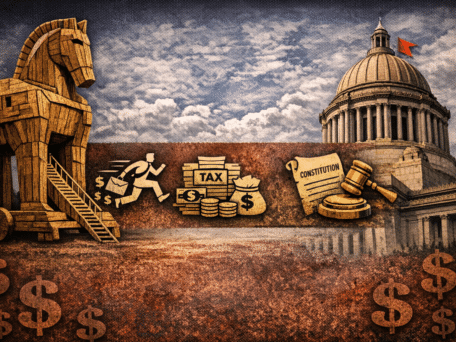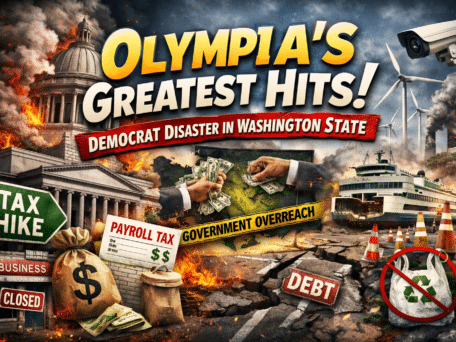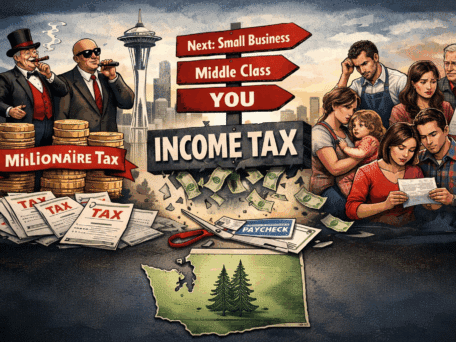Jay Inslee used his annual State of the State address on Tuesday to outline his usual big-government agenda for 2016. And, our green governor also used the speech to begin laying the foundation for his re-election campaign — and, unsurprisingly, a very far-Left foundation it is.
For instance, last year, Inslee called for a hike in the minimum wage during his State of the State address. And, he tried to to make that happen, working with House Democrats on a bill that would raise the minimum wage with annual increases to $12 an hour in 2019, and then be adjusted for inflation afterward. Of course, the bill failed. Inslee responded to the failure by declaring it would be “up to the people” to raise the minimum wage.
Well, apparently, when our green governor said that raising the minimum wage was “up to the people,” he didn’t mean he would leave it entirely up to the people. This year, Inslee used his speech as an opportunity to call for an unprecedented statewide hike in the minimum wage… by supporting for a labor-backed initiative to push the minimum wage to $13.50. That increase of more than $4 over the current rate is quite a jump from the wage Inslee and his fellow Democrats pushed in 2015.
It appears that, as with the state income tax, the Democrats approach raising the minimum wage with an “if at first you don’t succeed, try, try again” attitude.
Inslee’s decision to push an initiative during the State of the State address raised a few eyebrows. The Spokesman Review,
“House Minority Leader Dan Kristiansen, R-Snohomish, criticized Inslee’s support of a newly filed initiative to raise the minimum wage and guarantee some sick leave, and questioned the use of public resources to back an initiative.
“Asked if he thought the governor violated state ethics laws by supporting it in his speech, Kristiansen said he wouldn’t go that far. But the comment prompted Inslee’s office to send out a 1975 attorney general’s opinion that a governor has a constitutional duty to recommend action to the Legislature and that extends to advocating a position on initiatives.”
As he did last year, Inslee also used the State of the State to call for a raise in state employee salaries—specifically, a hike in teachers’ salaries this time around. Inslee told lawmakers that our state needs 7,000 more teachers, and fixing that shortage requires a “small, but important first step” of raising wages. He said he would push for a raise in beginning teacher salaries from about $36,000 to $40,000 a year and a minimum 1 percent raise to all teachers.
In order to pay for the raises, Inslee proposed eliminating four existing tax incentives. These include removing the sales-tax exemption for bottled water, ending certain tax breaks for oil refineries which recycle their fuel, eliminating exemptions in the real-estate excise tax, and ending the sales-tax exemption for some people living outside Washington state. In other words, using Inslee’s own definition for eliminating tax breaks, our green governor—as he has every year since taking office—called for tax increases.
The tax increases would raise about $101 million in the next fiscal year. Of course, Inslee’s latest proposal comes just a few months after state lawmakers approved cost-of-living raises for school workers in the last budget. Unfortunately, those raises where not enough to satisfy the Washington Education Association (WEA)—as the multiple teacher strikes at the beginning of the school year proved. So, Inslee is really just doing what he does best… doing everything he can to make the WEA happy.
Republican lawmakers provided some common sense perspective on Inslee’s new tax plan following his speech. The Seattle Times,
“Sen. Andy Hill, of Redmond, the chief GOP budget writer, criticized the governor’s tax-exemption proposal to pay for teacher-salary increases, saying, ‘Taxes should be the absolute last resort.’
“While he acknowledged the teacher shortage is a problem, Hill said lawmakers first should address the teacher-pay issues called for in the McCleary decision. The Supreme Court has said teachers salaries are part of basic education and should be paid by the state. Currently, most school districts use local levies to supplement what the state provides for teachers.
“Hill also questioned whether so much spending was needed in the governor’s supplemental budget.”
Inslee’s plan to close selected tax exemptions has inherent—and problematic—consequences. Take the tax incentive for fuel recycling as an example. Eliminating this particular tax exemption would make Washington the only state in the country that would put a tax on refineries which use their own waste product to generate energy.
In the past, Inslee has justified his call for ending the “loophole” by claiming that, due to the exemption, Washington’s tax code subsidizes “Big Oil.” And, that our state is giving millions away to “Big Oil”. Of course, both the claims are examples of the far-left attempting to drum-up support for their destructive agenda through deceptive rhetoric.
As Shift has pointed out, the reality is that refineries in our state pay quite a lot in taxes. In fact, the Washington Research Council recently found that Washington refineries pay approximately three times more in taxes than those in California. In total, Washington’s five refineries pay a total of more than $268 million a year in taxes.
Additionally, recycled refinery fuel has no market value. Often it exists only for a few moments before being reused in the refining process. The most ironic part of Inslee’s far-left agenda is that, if refiners did not recycle the fuel, they would be forced to rely on more natural gas. That would, in turn, decrease efficiency and increase fossil fuel consumption.
Our green governor’s push to close tax exemptions on oil refineries despite the negative consequences is just another example of how far he will go to pursue an extreme “green” agenda that sounds good, but doesn’t quite pass the “it actually works” muster.




